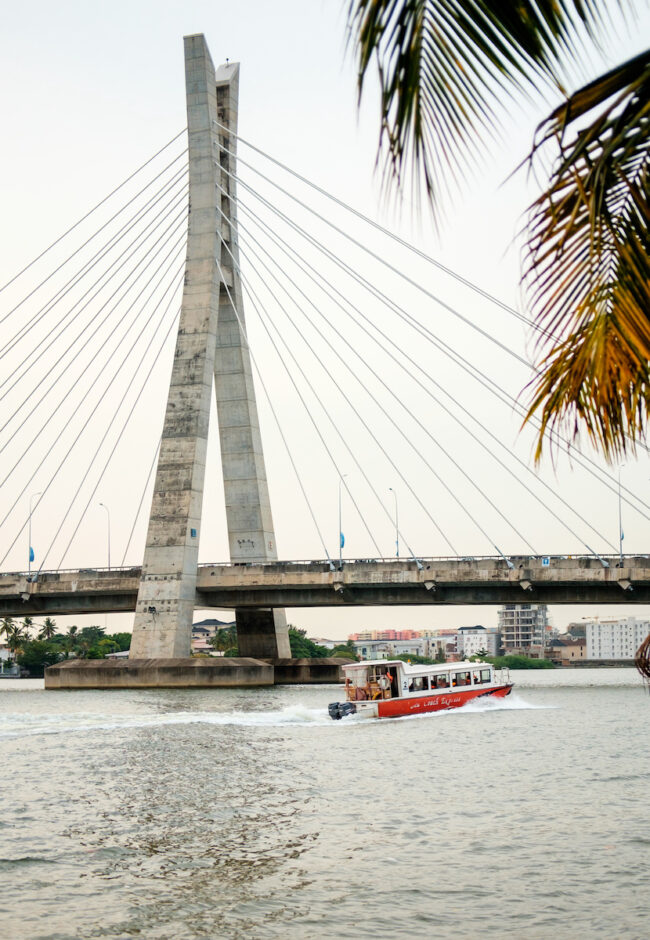
Lagos, Nigeria – © Sam makoji, Getty Images
Welcome to Lagos, the largest city in Black Africa, with around 20 million residents and its “go-slows”, gigantic traffic jams that keep cars moving at a snail’s pace from early in the morning until late at night. Having crossed the “mainland”, a vast urban expanse of slums and working-class neighborhoods, we took the 10-km Third Mainland Bridge to reach “the islands”, home to businesses and upper-class neighborhoods. The electric city of Lagos is not much of a place for wandering, but it’s still a city for partying and enjoyment, as long as you know how to act and the best places to go.
by Cécile de Comarmond
This guide has appeared in our 5th isssue.
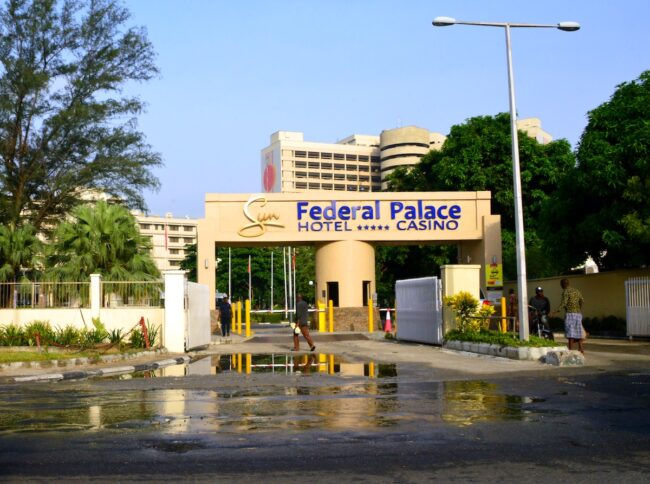
Lagos, Nigeria: Federal Palace Hotel and Casino – @ mtcurado, Getty Images
Where to sleep
Lodging is expensive in Lagos. You won’t find a decent hotel room on the islands for less than a hundred dollars per night.
*
With its modest prices and bed & breakfast look, Bogobiri is the favorite spot for journalists, traveling artists, and adventurers. Rooms are tastefully decorated, the hallways are filled with artwork, and the hotel’s two bars are full almost every night of the week.
**
In a more classic style, The Wheatbaker, a four-star hotel, offers great service while keeping a personal touch. The lunch buffet is delicious and plentiful, and the spa gives legendary massages.
To see and be seen, stay at the Maison Fahrenheit, the latest trendy hotel, on Victoria Island. We liked the chic, eclectic décor, the broad-striped lounge chairs next to the pool, and the rooftop, a nightlife haven with a hip, young crowd.
***
Always a good choice, the Federal Palace is a Lagos institution – it’s even said that the agreement for Nigerian independence was signed here. One of the wings of the hotel has been completely renovated and the grand swimming pool, bordered by canopy beds, offers a nice escape from the hectic city.
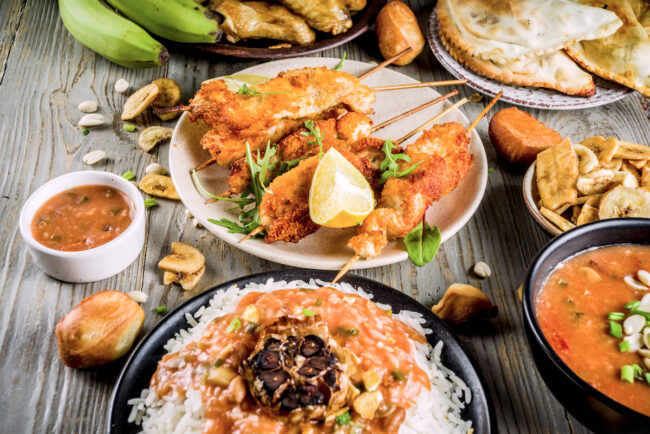
Lagos food – © Rimma Bondarenko, Shutterstock
Where to eat
Until very recently, finding a good restaurant in Lagos was virtually impossible. But the culinary landscape is rapidly changing in this Nigerian center of commerce.
NOK by Alara, with its stylish interior design, is the first restaurant in Africa for the king of contemporary African cuisine, Senegal’s Pierre Thiam. Here you’ll find refined Nigerian cuisine with a twist, with dishes like the famous pepper soup served with crayfish, plantain and cassava pancakes, and a hibiscus tart. For a more traditional cuisine – like Jollof rice, made with tomatoes and spices, or giant snails – head to Yellow Chilli.
At RSVP, a restaurant with a New York loft vibe, Lagos’ high society has been streaming in to get a taste of a menu that’s short but effective: deluxe hamburgers, risotto and beef, and of course, delicious cocktails. On weekends, a DJ gets the crowd dancing by the pool.
Sky, the restaurant with panoramic views in the Eko Hotel, is a place for special occasions. The menu is pricey, but people go there particularly to eat sushi and sip cocktails or glasses of champagne while admiring the lights of the city.
With more authentic style, Glover Court, which has gone from being a little stand on the street to being a Lagos institution, offers the best suyas in the city. Suyas are little skewers of marinated beef and chicken, fried first in oil, then cooked on a grill.
For an espresso, a cappuccino, or another drink to satisfy your caffeine addiction, we liked the relaxed atmosphere of Cafe Neo, whose arabica coffees are 100% African. With its handsome wooden tables and its shaded patio, Art Café is another cozy option to get a coffee or an aperitif.
Lastly, the best wood-fired pizza in Lagos can be found at Pizze-Riah, the most popular spot on Victoria Island on Sunday evenings.
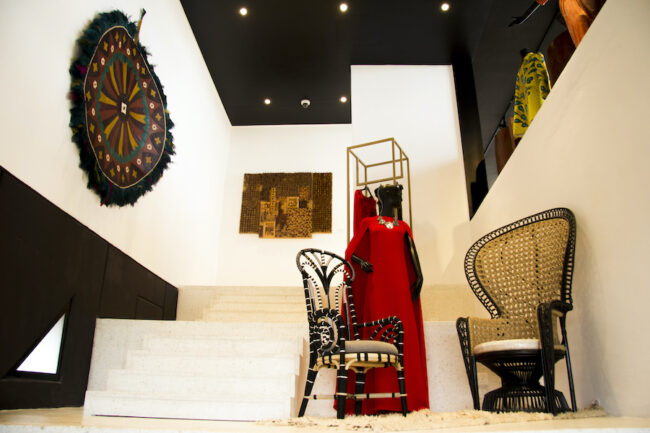
ALARA – © Emmanuel Arewa
Where to shop
The concept store ALARA is the first public building in Africa from talented Ghanaian architect David Adjaye. Its four levels contain the chicest interior design, artisan, and fashion items that Africa has to offer.
For a 100% Nigerian designer handbag made from Kano leather, head to Zashadu, which finally has a store in Lagos as of October 2016 (22 Abike Sulaiman, off Adebayo Doherty, Lekki Phase 1, open Tuesday through Sunday).
Hidden behind a discreet gate, Temple Muse also offers a nice selection of Nigerian creations for women, hand-picked works of art, and a sitting room where you can have a coffee, a homemade cupcake, or a glass of champagne.
The immense Nike Gallery from artist Nike Davies-Okundaye covers multiple floors, with works from numerous Nigerian painters displayed. The selection is mismatched and the prices are pretty high, but the gallery remains a must-see, if for no other reason than to meet the artist, with her legendary look marked by spectacular hairstyles.
Lastly, The Jazzhole offers a very specialized selection of Nigerian records and a few books that you can leaf through while having a tea.
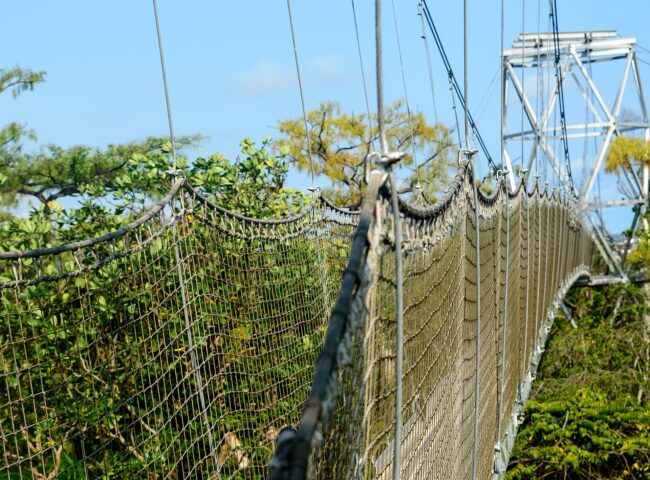
© Turizimpressions – Lekki Conservation Center, Canopy walk
Where to explore
The New Afrika Shrine, the nightclub of musician Fela Kuti, the king of Afrobeat music, was a center of Nigerian counter-culture. Years after Kuti’s passing, his son Femi revived the legendary nightclub with New Afrika Shrine, located next to the original establishment in Ikeja, a suburb of Lagos. When he’s not touring abroad, Femi performs there on Thursday and Sunday nights. For just a few nairas – between $5 and $10 – you can watch a few hours of performances in a laid-back, friendly atmosphere. To learn more about Fela Kuti, the Kalakuta Republic Museum is located in the artist’s former home, where he lived with his children, his musicians, and his 27 wives, who he married all on the same day.
For theater lovers, the place to go is Terra Kulture on Sunday afternoons. This cultural center houses a small, pleasant restaurant and bar, a bookstore, an exhibition room, and a theater.
Lagos Island, the city’s former center of business, remains one of the only places where you can wander about and get lost in the labyrinth of shops in Balogun Market and around the Central Mosque. You can then stop by Freedom Park, a former prison, a sad vestige of the colonial era that has been transformed into a public park where you can lie out on the grass while sipping a smoothie or having a vegan burger. On the last Friday of each month, people come to the park to dance to Afropolitan Vibes, a colorful group of musicians.
The Lekki Conservation Centre is one of the rare escapes in Lagos where you can go for a breath of fresh air on the weekends. People go there to picnic and to walk through the lush vegetation inhabited by monkeys, peafowl, and other colorful birds. As of recently, you can go up and visit the park from the treetops on the “canopy path.”
Learn more
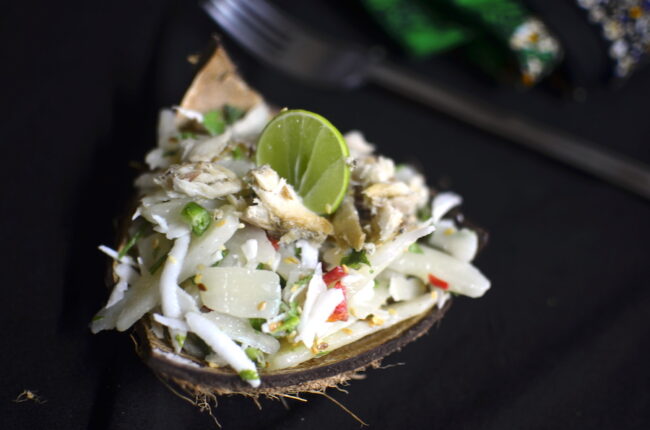
© Kitchen Butterfly
Kitchen Butterfly, an ambassador for Nigerian cuisine
Ozoz Sokoh is 40 years old and wears many different hats. This mother of three is a geologist for an oil company. When she’s not busy with those two jobs, she spends her time cooking. On her blog, she posts her “fusion” recipes, classics of Nigerian cuisine with added influences from Brazil or Asia, like cassava and coconut salad, curry with “scent leaves” (a local herb similar to Japanese shiso), palm wine granita and soursop sorbet, and more. Sokoh also lends her cooking talents to private dinners in Lagos, and you can taste her delicious small plates at culinary events like the recent World Jollof Rice Day or monthly lunches organized by bloggers from Eat.Drink.Lagos.
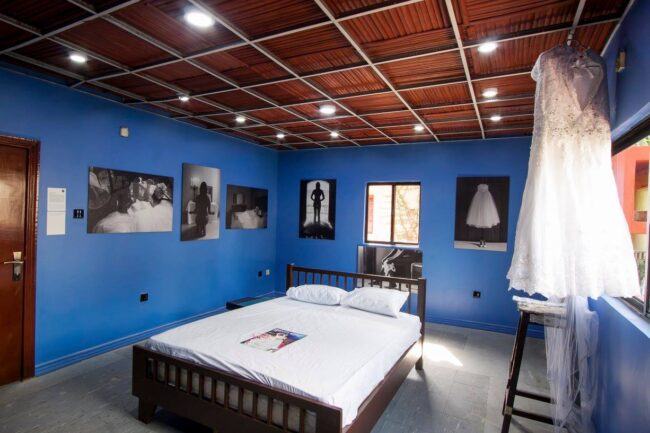
© Lagos Photo Festival
The Lagos Photo Festival, or when Africa shows off
Nigerian Azu Nwagbogu created the LagosPhoto festival in 2010 in order to give Africans the opportunity to take back their history through images and create a community of contemporary photographers from around the world. Each year, for one month – in 2016, from October 22nd to November 23rd – photos are put on display outdoors in several places in the city. Alongside the photo exhibitions, there is a series of talks, viewings, film showings, workshops, and other events. Big names like Samuel Fosso, Martin Parr, and Cristina De Middel have participated. After taking a look at fiction in the 2015 edition, in 2016, LagosPhoto examined performance and rituals in photography.
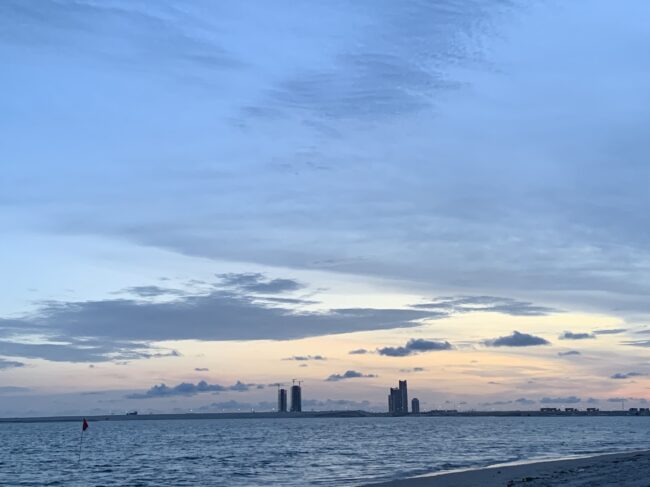
Oniru Beach, Lagos – © Peace Itimi
Clubs, an enduring tradition in Lagos
Before the Lagos Polo Club was founded in 1904, its site served as a landing strip for the British military. Today, this vast stretch of green is home to an annual polo tournament. It is an incredible spectacle, both on and off the field! Among the players, besides professionals from Argentina and South Africa, you’ll find sons of some of the most influential families in the country, politicians, and businessmen from the North. In front-row seats sits a veritable who’s who of Nigerian high society.
A heritage of the British colonial era, clubs remain very selective places – membership is by invitation – where deals are signed over gin and tonics. The best-known clubs are the Ikoyi Club, home to a magnificent golf course in the heart of the city, and the Yacht Club, a charming establishment with an aged feel, an unobstructed view of the ocean and the harbor, and its bar with pillars that are half-gentleman, half-sea lion.
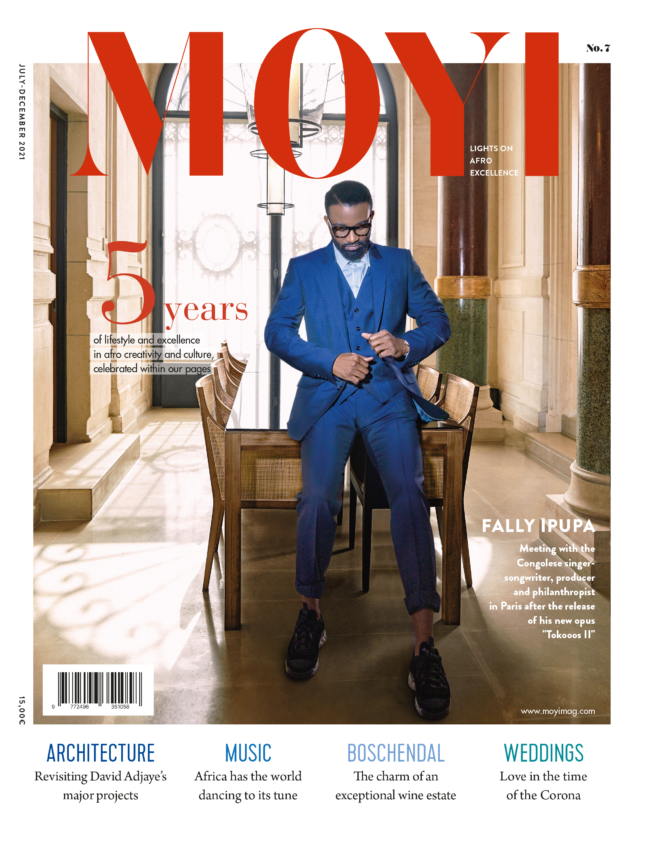 buy a print or digital issue
buy a print or digital issue
